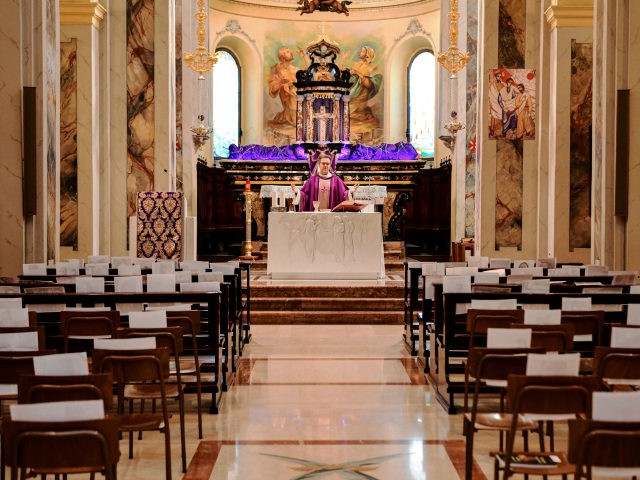The Archbishop of Armagh, Eamon Martin, has sharply criticized a ban on public worship, calling the measure “draconian,” “provocative,” and “unnecessary.”
Statutory instrument 171 of 2021, which was officially published on Friday, prohibits all religious services except weddings and funerals, while instructing clergy to conduct virtual services in lieu of in-person worship.
Priests or other ministers of religion should “lead worship or services remotely through the use of information and communications technology,” the instrument states, as a means of curbing the spread of the coronavirus.
“We consider the publication of this statutory instrument, together with associated penal provisions, to be provocative and formally enacting a potential infringement of religious freedom and of constitutional rights,” said Archbishop Martin, who is the primate of all Ireland.
The archbishop said the instrument was introduced in a “clandestine manner without notice or consultation,” noting that the Irish bishops were not made aware of the law until Friday, despite its having been signed on Monday of last week by Health Minister Stephen Donnelly.
We have “consistently impressed on government that people of faith value highly their spiritual well-being and consider the public practice of their faith as essential — something which has not been sufficiently recognised in statute,” Martin said.
The instrument is especially disappointing given “reassurances of the Taoiseach to Church leaders only three days ago that he understood the importance of faith and worship to the people of Ireland,” he added.
“We will seek an immediate meeting with Minister Donnelly and we request the suspension of this harsh and unclear statutory instrument,” Martin said.
The archbishop also took his complaints to Twitter, insisting that the instrument was “published without consultation” and is “confusing and unnecessary with regard to public worship.”
“The Churches have been cooperating fully with #COVID19 restrictions to protect health, life and the common good,” he added.
Even prior to the latest regulation, Ireland has distinguished itself for the harshest suppression of religious practice in all Europe, with months of lockdown and no Masses in the formerly Christian nation.
Earlier this month, Bishop Denis Brennan of Ferns attributed the harsh restrictions to an “unwillingness or inability in Ireland to appreciate the value of religion or spirituality” during the pandemic.
“I share the pain of many in Ireland at present as public worship is still not permitted,” the bishop said on April 4.
While the prelate said he is “very conscious” of the need for measures to stem the spread of the coronavirus, he added that it must not be at the expense of “religion and spirituality.”
In a similar statement, Bishop Alphonsus Cullinan of Waterford and Lismore protested government discrimination against people of faith, saying on March 31 that the spiritual wellbeing of the Irish was being “eroded” because of ongoing bans on worship.
“I must speak out to represent the voices of a very large cohort of people who are growing increasingly weary of being unable to attend Mass and whose spiritual and mental wellbeing is being eroded,” the bishop said. “Their patience is wearing thin. They are frustrated and feel unrepresented and discriminated against.”
“It is very difficult to explain to people why they are banned from public worship bearing in mind also that Ireland is one of the tiny few countries in Europe where public worship is not allowed,” he added.
On Easter Sunday, Pope Francis criticized such “severe” measures, calling for a lifting of restrictions on public worship.
“Dear brothers and sisters, once again this year, in various places many Christians have celebrated Easter under severe restrictions and, at times, without being able to attend liturgical celebrations,” the pope noted during his annual Easter blessing.
“We pray that those restrictions, as well as all restrictions on freedom of worship and religion worldwide, may be lifted and everyone be allowed to pray and praise God freely,” he said.

COMMENTS
Please let us know if you're having issues with commenting.